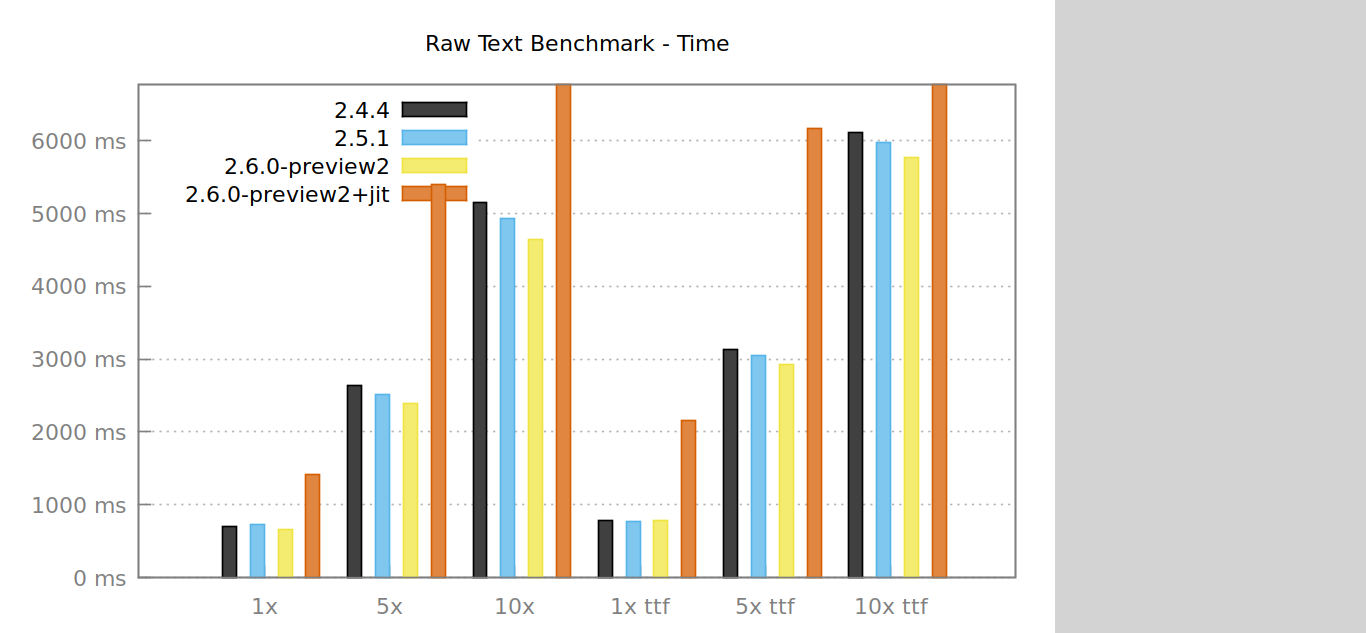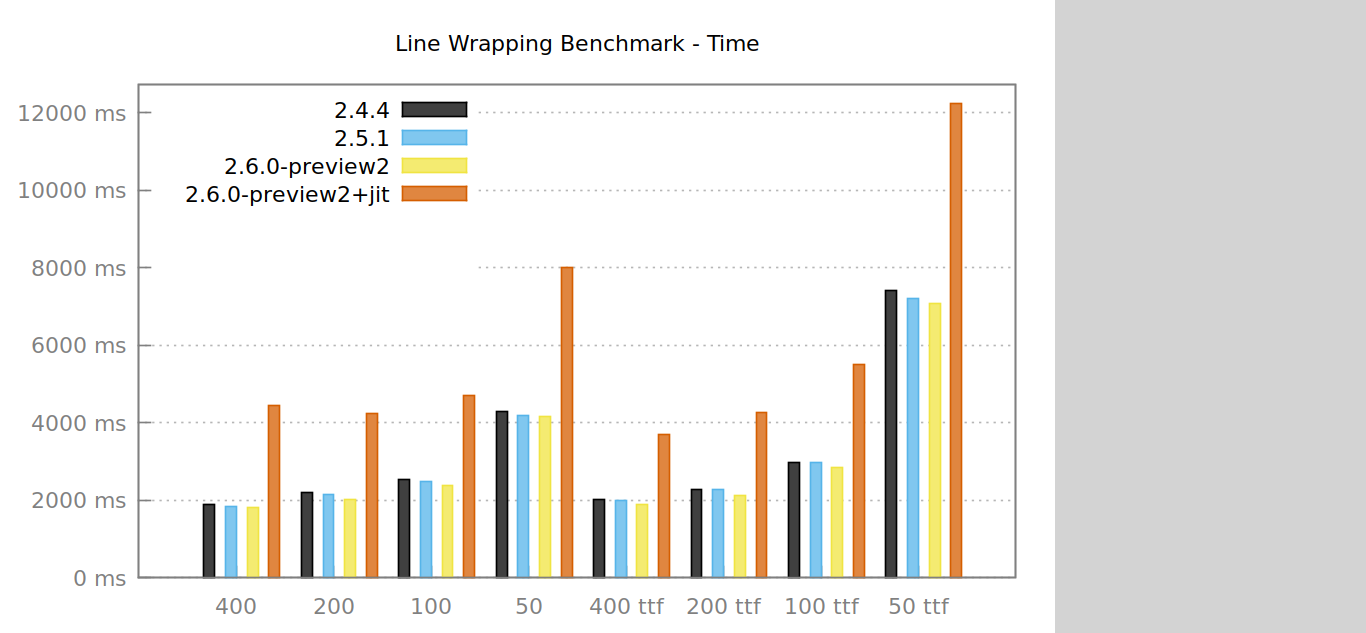Ruby 2.5/2.6
New Features and Performance Improvements
by Thomas Leitner
Ruby 2.5
Ruby 2.5 New Features
- rescue/else/ensure are now allowed to be used directly with do/end blocks. Feature #12906
- Print backtrace and error message in reverse order (oldest call first, most recent call last) Feature #8661
- Support branch coverage and method coverage measurement. Feature #13901
- Top-level constant look-up is no longer available. Feature #11547
Ruby 2.5 New Features (cont.)
- One of our most loved libraries, pp.rb, is now automatically loaded. You no longer have to write require “pp”. Feature #14123
- Promote cmath, csv, date, dbm, etc, fcntl, fiddle, fileutils, gdbm, ipaddr, scanf, sdbm, stringio, strscan, webrick, zlib from standard libraries to default gems.
- Onigmo 6.1.3 absence operator
(?~exp)(also in 2.4.1)
Ruby 2.5 New Features (cont.)
- Better RDoc by using Ripper instead of IRB based parser
- IO#write now receives multiple arguments. Feature #9323
- Hash#transform_keys Feature #13583
-"literal"(String#-@) optimized to return the same object (same as"literal".freezein Ruby 2.1+) Feature #13295binding.irbautomatically requires irb and runs Bug #13099
Ruby 2.5 Performance Improvements
- 5-10% due to removal of
traceinstructions (dynamic instrumentation is used instead) Feature #14104 - Block passing by a block parameter (e.g.
def foo(&b); bar(&b); end) is about 3 times faster than Ruby 2.4 by “Lazy Proc allocation” technique. Feature #14045
Ruby 2.5 Performance Improvements (cont.)
- Improve performance of some built-in methods including
Array#concat,Enumerable#sort_by,String#concat,String#index,Time#+, and more. IO.copy_streamuses copy_file_range(2) to provide copy offloading. Feature #13867
Ruby 2.5 Further Reading
- https://www.ruby-lang.org/en/news/2017/12/25/ruby-2-5-0-released/
- https://github.com/ruby/ruby/blob/v2_5_0/NEWS
- https://medium.com/rubyinside/the-new-absent-operator-in-ruby-s-regular-expressions-7c3ef6cd0b99
- https://gettalong.org/blog/2017/benchmarking-ruby-2-5.html
Note: The items for the slides “New Features” and “Performance Improvements” were mostly taken verbatim from the first two links.
Ruby 2.6
Ruby 2.6 New Features
- Add Binding#source_location. Feature #14230
- Constant names may start with a non-ASCII capital letter. Feature #13770
- Endless range syntax (1..), same as (1..nil) Feature #12912
- Range#=== now uses #cover? instead of #include? method (#cover? is faster because it only checks the bounds) Feature #14575
Ruby 2.6 Performance Improvements
- Introduction of JIT Feature #14235
- Speedup Proc#call because we don’t need to care about $SAFE any more. Feature #14318
- Speedup block.call where block is passed block parameter. Feature #14330
Ruby 2.6 JIT (YARV-MJIT)
- By Takashi Kokubun (and Vladimir Makarov)
- Use
--jitto activate it (there are some other options) - Compiles C code via gcc/clang
- Significant enhancements between preview1 and preview2
- Follow changes on Github https://github.com/ruby/ruby/commits?author=k0kubun
- Enhancements measured using optcarrot benchmark which is also used for Ruby 3x3 measurement
Ruby 2.6 Further Reading
- https://www.ruby-lang.org/en/news/2018/05/31/ruby-2-6-0-preview2-released/
- https://github.com/ruby/ruby/blob/v2_6_0_preview2/NEWS
- https://developers.redhat.com/blog/2018/03/22/ruby-3x3-performance-goal/
- https://blog.heroku.com/ruby-mjit
- https://medium.com/@k0kubun/benchmark-driver-designed-for-ruby-3x3-6a5eeb1d1494
- https://speakerdeck.com/k0kubun/method-jit-compiler-for-mri
- https://github.com/benchmark-driver/benchmark-driver
Ruby AST Differences
Demo time
ruby -ve "puts RubyVM::InstructionSequence.
compile('x, y = 1, 2; [x, y].max').disasm"
Benchmarking
Available Tools
- Built-in library
benchmark - Better: gem
benchmark-ips - Newest: gem
benchmark-driver
benchmark
- Very simple
-
Usage:
Benchmark.bm do |x| x.report("name1") { code1 } x.report("name2") { code2 } end - Better use
Benchmark.bmbmsince it warms up the runtime - You need to determine the loop count yourself
benchmark-ips
-
Usage like with
benchmark:Benchmark.ips do |x| x.report("name1") { code1 } x.report("name2", "code-as-string") x.compare! end - Warm-up done by default
- Determines loop count automatically
- Helper method for easy comparions
- Allows to pass code as string to avoid block-calling avoid
benchmark-driver
- Made by Takashi Kokubun to easily test different versions of Ruby and micro-benchmarks
-
Usage similar:
Benchmark.driver do |x| x.prelude "set-up code here" x.report("name1", "code-as-string") x.report("name2", "code-as-string") end - In addition to warm-up and loop count determination, it subtracts the loop overhead itself which is important for micro-benchmarks
- Allows testing multiple Ruby version using rbenv
- Drive benchmarks using simple YAML files
Benchmark Demo Time
a < b ? b : a
vs
[a, b].max
HexaPDF Benchmarks
- Same code run on different Ruby versions
- Alas, Ruby 2.6 in JIT-mode is slower
Raw Text Benchmark

Line Wrapping Benchmark

Optcarrot
The official benchmark for verifying the Ruby 3x3 goal!
git clone git@github.com:mame/optcarrot.git
cd optcarrot
# switch to Ruby 2.6-preview2
ruby -Ilib bin/optcarrot --benchmark examples/Lan_Master.nes
ruby --jit -Ilib bin/optcarrot --benchmark examples/Lan_Master.nes
# switch to TruffleRuby :)
ruby -Ilib -r./tools/shim bin/optcarrot --benchmark examples/Lan_Master.nes
Thank You
You can find the files used during the presentation in the files directory.